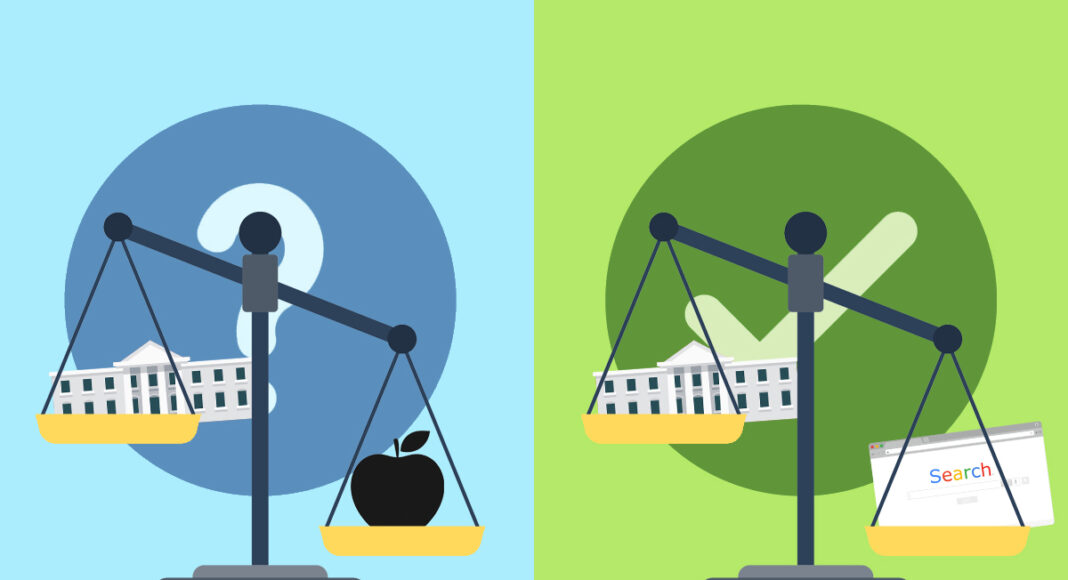According to a poll conducted by ProMarket at the Stigler Center Antitrust and Competition Conference, experts were skeptical about the Department of Justice’s antitrust case against Apple, with 54% believing it had the lowest odds among the five Big Tech antitrust cases of a ruling in favor of the government. In contrast, the experts were more optimistic about the government’s chances in the Google AdTech case, with 52% saying it had the best odds for a government win, and another 21% favoring the Google Search case.
Competition experts expressed skepticism about the antitrust case against Apple brought by the Department of Justice and 15 states, though they were more optimistic about the government’s chances against Google.
At this year’s annual Stigler Center Antitrust and Competition Conference, an event the Financial Times described as “where all the economists, lawyers and many journalists who care about competition policy gather,” attendees were polled by ProMarket to get their reading on various developments in antitrust policy and enforcement in the United States.
Guests at the conference included professors of economics and law, policymakers, historians, University of Chicago students and individuals from civil society and nonprofit institutions. The headline question of the conference, which was launched in 2017 and has become a notable event among competition scholars and practitioners, and the topic of the first panel was whether antitrust has a definitively positive impact on productivity in the U.S.
The question is pertinent in 2024, as antitrust enforcement has seen something of a resurgence in recent years, with much of the claimed motivation to be to protect innovation. The federal antitrust cases brought against Big Tech companies—Amazon, Apple, Google and Meta—exemplify this new regime.
Overall, the 29 conference attendees who participated in ProMarket’s poll were bullish on recent federal cases brought against Big Tech companies, with nearly 60% indicating that these cases would be slightly positive for innovation and about 30% indicating that the cases were very positive.
They were also generally in favor of the enforcement strategy taken by the Department of Justice Antitrust Division under Assistant Attorney General Jonathan Kanter and Federal Trade Commission (FTC) under Chair Lina Khan. In response to a question about the enforcement approach taken by Khan and Kanter, 72% and 69% of respondents respectively agree or strongly agree that it has been an improvement compared with the practice over the last few decades. Just 14% of respondents disagreed with Khan’s enforcement approach and 8% disagreed with Kanter’s.
That optimism did not, however, extend to the DOJ’s recent lawsuit against Apple for violating Section 2 of the Sherman Antitrust Act and maintaining a smartphone monopoly. When asked which Big Tech case they believed had the lowest odds for a ruling in favor of the government, 54% of respondents indicated that the Apple lawsuit was the weakest.
On the other side of the coin, 52% of respondents said that the Google AdTech case has the best odds for a government win, and another 21% favored the Google Search case.
On the headline question of the conference — how properly enforced antitrust will impact long-term productivity growth — conference participants were cautiously optimistic with 52% saying the effect would be slightly positive and 38% saying the effect would be quite positive.
Lastly, when asked about how regulators should approach competition in the next big market— artificial intelligence — participants were not nearly as aligned as they were on the questions of antitrust cases and productivity growth. The results were a mixed bag, with 40% indicating focus should be on ensuring competitive markets, 25% saying the government should prioritize ensuring that algorithms do not deliver biased or inaccurate results, some emphasized privacy, while others said there should be no regulation at all.

You can watch all the panel recordings on YouTube:






